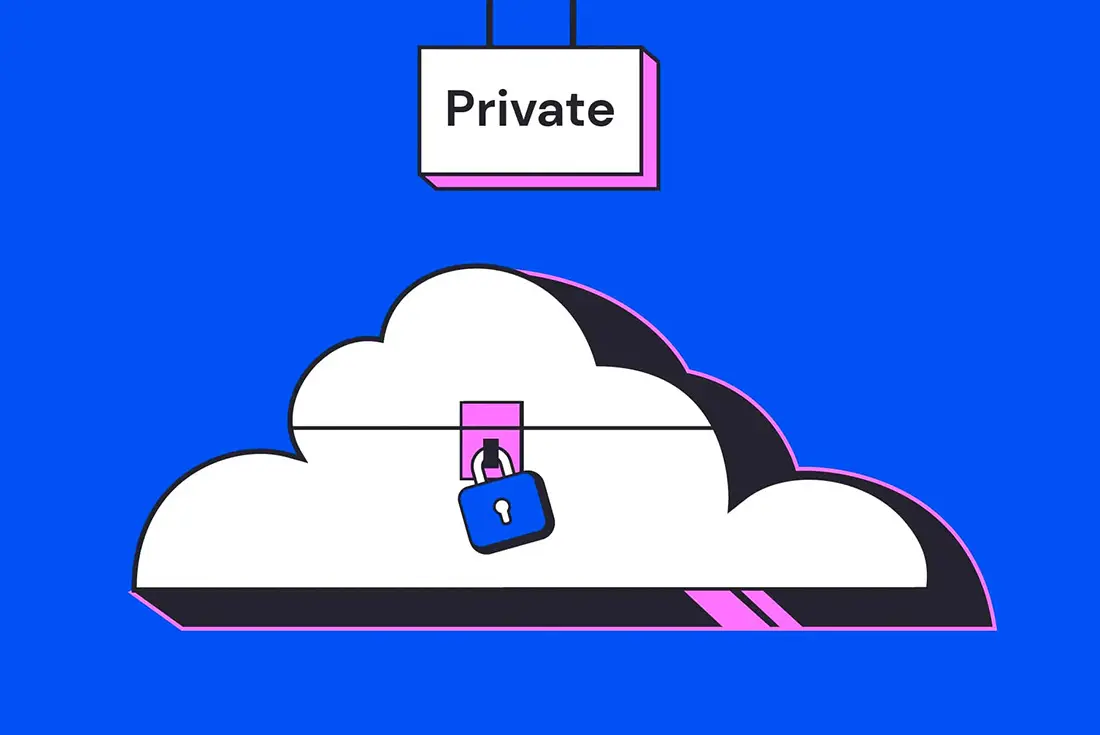
11 Jul Safeguarding Your Digital Assets: 5 Tips for Protecting Your Data in a Private Cloud
Imagine a scenario where a disgruntled employee, a cybercriminal, or even a simple misconfiguration exposes your company’s sensitive data to the world. The repercussions could be devastating – financial losses, reputational damage, and even legal consequences. This isn’t just a hypothetical scenario; it’s a risk that all businesses face in today’s interconnected world. Fortunately, there’s a solution that offers an extra layer of protection for your valuable information: the private cloud, a dedicated cloud storage for businesses solution.
While the public cloud provides flexibility and scalability, private clouds offer enhanced control and security, making them an attractive option for many businesses. However, even in a private cloud environment, data security cannot be taken for granted. It’s essential to proactively implement security measures to safeguard your digital assets. In this article, we’ll delve into five essential strategies to ensure your data remains secure within your private cloud.
Why Private Cloud Security Should Be a Top Priority for Small Businesses
Small businesses often operate under the misconception that they are not attractive targets for cybercriminals. However, this couldn’t be further from the truth. In fact, small businesses are increasingly becoming the preferred targets for cyberattacks, due to their often less robust security measures and valuable data. A successful cyberattack can cripple a small business, leading to financial losses, reputational damage, and even closure.
Here’s why private cloud security should be a top priority for small businesses.
Data Breaches
Small businesses often store sensitive data, such as customer information, financial records, and intellectual property, in the cloud. A data breach in their cloud storage for businesses solution can expose this information to unauthorized parties, leading to legal and financial repercussions. A data breach can expose this information to unauthorized parties, leading to legal and financial repercussions.
Ransomware Attacks
Ransomware attacks, where hackers encrypt your data and demand a ransom for its release, are on the rise. Small businesses are particularly vulnerable to these attacks, as they often lack the resources to recover from a ransomware incident.
Business Disruption
A cyberattack can disrupt your business operations, leading to downtime, lost productivity, and dissatisfied customers. In some cases, the damage can be so severe that it forces the business to shut down.
Reputational Damage
A security breach can tarnish your company’s reputation, making it difficult to attract and retain customers. In today’s digital age, trust is essential for business success, and a security incident can erode that trust.
Regulatory Compliance
Many industries have strict data protection regulations that businesses must adhere to. Failure to comply with these regulations can result in hefty fines and legal penalties. A private cloud can help you meet these compliance requirements, but only if it is properly secured.
Small businesses should not underestimate the importance of private cloud security. By investing in robust security measures and implementing best practices, you can protect your valuable data, ensure business continuity, and safeguard your company’s future. Remember, prevention is always better than cure, and a proactive approach to security can save you from significant financial and reputational losses in the long run.
Here are some signs that your small business should start prioritizing private cloud security:
- You store sensitive data in the cloud, such as customer information, financial records, or intellectual property.
- You have experienced a security incident in the past, or you are concerned about the increasing threat of cyberattacks.
- You are not sure how secure your private cloud environment is, or you don’t have the resources to manage it effectively.
- You want to ensure compliance with relevant data protection regulations.
If any of these scenarios apply to your business, it’s time to take a closer look at your private cloud security and implement measures to protect your valuable data.
Ready to embrace the power of the private cloud but concerned about security? Let Downtown Computer Services, your trusted IT partner in Boca Raton and Fort Lauderdale, guide you through the seamless transition. We specialize in helping small businesses migrate to private cloud environments and implement robust security measures tailored to your unique needs. With our expertise in cloud computing in Fort Lauderdale, we can help you leverage the benefits of the cloud while ensuring your data remains safe and secure. Don’t leave your valuable data vulnerable to cyber threats. Contact us today at (954) 524 9002.
1. Implement Robust Access Controls
Access controls are the gatekeepers of your data, determining who can enter and what they can do once inside. In a private cloud, you have the power to define granular access controls tailored to your specific needs. This involves establishing clear user roles and permissions, ensuring that individuals have access only to the data necessary for their job functions.
Consider implementing the principle of least privilege (PoLP), granting users the minimum level of access required to perform their tasks. This limits the potential damage in case of a compromised account. Employ strong authentication methods, such as multi-factor authentication (MFA), which requires users to provide multiple verification factors to access sensitive data. Additionally, regularly audit user access logs to identify any unauthorized access attempts or suspicious activity.
2. Encrypt Your Data
Encryption is the process of converting data into an unreadable format, making it inaccessible to unauthorized parties. In a private cloud, you have greater control over the encryption process, allowing you to choose the most suitable encryption algorithms and key management strategies for your specific needs.
Encrypt your data at rest (when it’s stored) and in transit (when it’s being transmitted). For data at rest, use encryption algorithms like AES-256. For data in transit, use secure protocols like HTTPS or TLS. Furthermore, regularly rotate encryption keys to minimize the risk of unauthorized decryption.
3. Monitor and Log Activities
Continuous monitoring and logging of activities within your private cloud is essential for detecting and responding to security incidents promptly. Implement comprehensive logging mechanisms that capture detailed information about user activities, system events, and any anomalies that may arise.
Use security information and event management (SIEM) systems to centralize log data from various sources, correlate events, and identify potential security threats. Set up alerts to notify you of suspicious activity, such as failed login attempts, unauthorized access to sensitive data, or unusual traffic patterns. By proactively monitoring your environment, you can quickly identify and address potential security breaches before they cause significant damage.
4. Regularly Update and Patch Your Systems
Software vulnerabilities are a goldmine for cybercriminals. To protect your private cloud, ensure that all systems, including operating systems, applications, and virtual machines, are regularly updated and patched with the latest security fixes.
Establish a robust patch management process that includes regular vulnerability scanning to identify potential weaknesses in your systems. Prioritize applying patches for critical vulnerabilities promptly. Consider automating the patching process to streamline updates and reduce the risk of human error.
5. Conduct Regular Security Assessments
Don’t wait for a security breach to expose vulnerabilities in your private cloud. Proactively conduct regular security assessments to evaluate your security controls’ effectiveness and identify improvement areas.
Engage external security experts to perform penetration testing, which involves simulating real-world attacks to identify and exploit vulnerabilities in your systems. Conduct regular security audits to ensure compliance with industry standards and best practices. By proactively addressing vulnerabilities and strengthening your security posture, you can minimize the risk of a successful attack.
Incident Response and Recovery Planning in a Private Cloud
Even with the best security measures, no system is completely foolproof. It’s crucial to have a well-defined incident response and recovery plan to minimize the damage and downtime in case of a security breach or data loss. The benefits of private cloud, including enhanced control and isolation, can streamline the incident response process, allowing for faster containment and remediation of security breaches.
Your incident response plan should outline the steps to identify, contain, and remediate the incident, as well as procedures for communicating with stakeholders and regulatory authorities. Your recovery plan should detail the steps to restore data and systems from backups or other sources, ensuring minimal disruption to your business operations.
Regularly test and update your incident response and recovery plans to ensure they are effective and up to date. By preparing for the worst, you can ensure your business can weather any storm and emerge stronger than before.
Conclusion
Protecting your data in a private cloud is an ongoing process that requires vigilance and proactive measures. By following these five essential tips, you can fully realize the benefits of private cloud and significantly enhance the security of your private cloud environment, and safeguard your valuable digital assets from evolving threats. Remember, the security of your data is not just an IT issue; it’s a business imperative that deserves your utmost attention.
Ready to fortify your private cloud and protect your business from cyber threats? Contact Downtown Computer Services, your trusted partner in cloud computing in Fort Lauderdale, for expert guidance and support in securing your digital assets. Dial: (954) 524 9002.
Key Takeaways
- Small businesses are vulnerable to data breaches, ransomware attacks, business disruption, reputational damage, and regulatory non-compliance, making private cloud security crucial.
- Implement robust access controls, encrypt data, monitor and log activities, regularly update systems, and conduct security assessments to safeguard your private cloud.
- Prepare for the worst-case scenario by having a well-defined incident response and recovery plan to minimize damage and downtime in case of a breach.
Check out other relevant news
- How Easy-to-Use Hacking Tools Are Fueling Cybercrime
- Cryptocurrency Security for Small Businesses: Protecting Your Wallet
- The Infostealer Epidemic: Protecting Your Business from the Latest Wave of Cyberattacks
- The Identity Crisis: How Compromised Credentials Can Cripple Your Business
- Beyond the Brick and Mortar: Building Your Online Storefront with Digital Marketing
